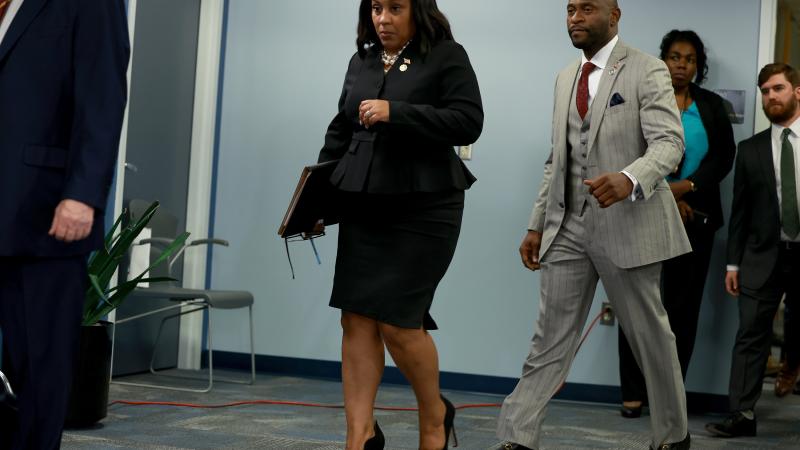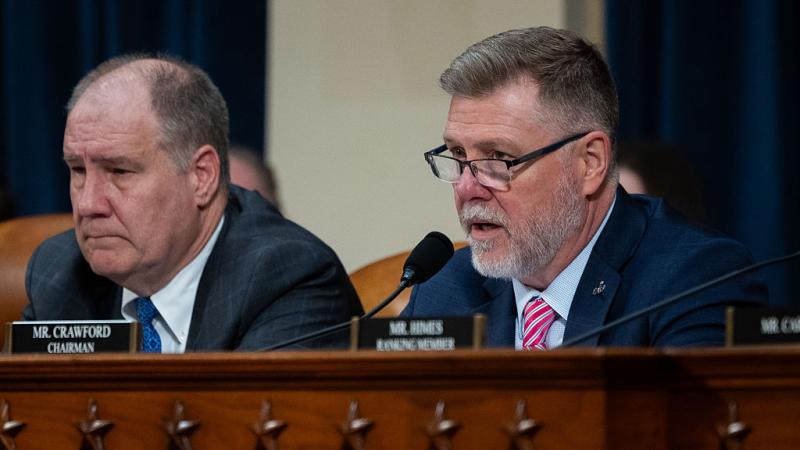Harris promises a ‘people-powered’ campaign, but in California she took actions favorable to donors
Evidence suggests Harris gave favorable treatment to big donors and political allies who supported her campaigns for San Francisco District Attorney and California Attorney General, calling into question her promise to be free from outside influences as a presidential candidate.
In her first major speech as the presumptive Democratic presidential nominee, Vice President Kamala Harris criticized Donald Trump’s big money donors and promised that her campaign would be instead powered by the people.
Addressing the assembled crowd in a Milwaukee suburb, Harris warned that Trump would do the “bidding” of “Big Oil companies” in exchange for donations and promised her campaign and administration would be different.
“On the other hand, we are running a people-powered campaign,” she said to a round of applause. “And we just had — some breaking news: We just had the best 24 hours — of grassroot fundraising in presidential campaign history.” USAToday reported that Harris nabbed $126 million in three days.
“And because we are a people-powered campaign, that is how you know we will be a people-first presidency,” she added.
Evidence suggests Harris historically gave favorable treatment to big donors and political allies who supported her campaigns for San Francisco District Attorney and California Attorney General, raising questions about the truth of her promise to be free from outside influences as a presidential candidate.
The Kamala Harris Campaign did not respond to a request for comment from Just the News.
Investigative reporters have said that when Kamala Harris first ran for San Francisco District Attorney in 2003, donations began to flow to her campaign coffers from unexpected sources: institutions and individuals connected to the local Catholic Church hierarchy.
Investigative author Peter Schweizer reported in his 2020 book Profiles in Corruption that Harris had no religious or other ties to the Catholic Church. However, her opponent, Terrance Hallinan—the incumbent district attorney—had worked to prosecute emerging priest sexual abuse cases in the Archdiocese of San Francisco, which threatened the local Catholic Church’s reputation and finances.
“Kamala Harris has a long history of using the machinery of the legal system to benefit friends and punish her adversaries,” Schweizer previously told Just the News of Harris’ tenure in California. It was the priest sex abuse cases that, Schweizer writes, was one of the earliest examples of this.
After news of the abuse scandal first broke, Hallinan launched an investigation and obtained internal records from the diocese detailing complaints going back approximately 75 years. After Hallinan’s criminal prosecutions were blocked by a Supreme Court ruling invalidating a California law extended the statute of limitations, he moved to publicly release the records with victims’ names redacted.
The Intercept reported in 2019 that Harris’s office "did not proactively assist in civil cases against clergy sex abuse and ignored requests by activists and survivors to access the cache of investigative files that could have helped them secure justice."
Harris ran to unseat Hallinan in the 2003 election in the middle of these efforts. As she did, individuals and organizations connected to the Catholic hierarchy began funneling donations to her campaign.
San Francisco campaign finance disclosures show lawyer Joseph Russoniello, who represented the church in several fields and served on the American Catholic Church body dedicated to reviewing abuse cases, donated at least $750 to Harris' campaign.
In Profiles, Schweizer reported that other law firms connected with the church also donated to her campaign, including Bingham McCutcheon, which did legal work relating to Catholic Charities. Another firm directly representing one San Francisco priest in an abuse case, Arguedas, Cassman & Headley, also donated, according to the disclosures.
After Harris narrowly defeated Hallinan in the election to become district attorney, her office reversed the efforts to publicly release the redacted files. Harris decided that the documents should not be released, even in redacted form, claiming that it was to protect the victims.
“District Attorney Harris focuses her efforts on putting child molesters in prison. We're not interested in selling out our victims to look good in the paper. When this case was brought under Terence Hallinan, prosecutors took the utmost care to protect the identity and dignity of the victims. That was the right thing to do then and it's the right thing to do now,” Harris’ office said in a statement at the time, according to SF Weekly.
Advocates for the victims—and the victims themselves—were furious with Harris’ decision. “It went from Terence Hallinan going hundred miles an hour, full speed ahead, after the Catholic Church to Kamala Harris doing absolutely nothing and taking it backwards hundred miles an hour,” said Joey Piscitelli, one sexual assault survivor, in a statement to The Intercept.
After refusing to release the files, the L.A. Times reported that Harris’ office never brought a single documented abuse case against any priests, neither during her seven year tenure as San Francisco District Attorney nor during her six year tenure as California Attorney General.
The San Francisco district attorney’s handling of the sexual abuse cases was not the only instance where Harris took action that may have helped her political benefactors. Shortly after she took office in 2004, Harris refused to prosecute nine women arrested by vice cops for prostitution, though the reason why may have been influenced by politics.
“It just leaves me in amazement," said then vice Captain Tim Hettrich, who said the action was "almost legalizing prostitution.”
Harris’ office said the cops should have focused more on arresting the clubs’ owners and alleged johns—an ordinarily reasonable explanation, even if one the police disagreed with. Her office also claimed that the department had made “no arrests” of those higher level offenders, but police said this was not true.
It turns out that Harris may have had another reason to drop the cases. The owner of both the Market Street and New Century theaters—where the offenses took place—was a company called Déjà Vu. One of that company’s owners was Sam Conti, a close associate of Willie Brown. As Just the News previously reported, Brown was a powerful political figure in California and San Francisco politics. Harris owes the beginning of her career to Brown’s patronage after she began dating him in the early 90s. According to Reuters, Brown was still legally married but had separated from his wife at the time.
By the time Harris became the California Attorney General in 2011 after a narrow election, it appears she continued to do favors for political allies that could financially benefit her, or her family. While she was in her first term as Attorney General, Harris married Douglas Emhoff, a high-powered lawyer in charge of the Los Angeles office of the prominent firm Venable LLP. As partner-in-charge of the office, he was involved in all the cases coming in and out of the office.
One of Venable’s key clients came up in a matter before Attorney General Harris, who chose to take an unusual path that favored the company. Herbalife, as well as several other nutritional supplement companies, was a client of Emhoff’s law firm at the time. Despite a memo from her own prosecutors in San Diego urging an investigation into the Los Angeles-based company, Harris declined to pursue the company.
Herbalife, a nutritional supplement company, had come under scrutiny along with other similar firms across the country for alleged exaggerated claims about their products. At the time, in 2015, several states and President Obama’s Justice Department were pursuing action against the companies, Herbalife included.
Harris’ state office was notoriously absent from the prosecutions, despite her office receiving more than 700 consumer complaints about Herbalife. “In July 2016, the FTC won a $200 million settlement against Herbalife. But Harris never even investigated the company,” Schweizer wrote in Profiles.
During this same period, the Podesta Group—Herbalife’s lobbyists in Washington, D.C.—threw a fundraiser for Harris in Washington, D.C.
As attorney general, Harris also blocked a nonprofit hospital deal after a major backer of her campaigns came out against the acquisition. Harris, as Attorney General, had regulatory responsibilities under the Non-Profit Hospital Transfer Statute to approve or block transactions involving such hospitals.
In 2014, the Daughters of Charity Health System in California was facing a difficult financial situation and sought to sell off its hospitals. The company selected a bid from Prime Healthcare Services for $843 million. The bid, which promised to uphold pensions for employees, keep the hospitals open for at least five years, and honor union contracts, was appealing for the Daughters of Charity system.
However, the Service Employees International Union (SEIU), a strong backer of Harris which had donated over $100,000 to her campaigns, opposed the deal, according to allegations contained in a lawsuit filed by Prime Healthcare against Harris.
“The Prime Healthcare complaint against Harris claimed that on February 20, 2015, Harris publicly ‘approved’ the transaction, but put impossible conditions on the deal. These were essentially 'poison pill’ requirements that her office knew would not be approved by Prime Healthcare. Indeed, the list of three hundred conditions was seventy-seven pages long. Furthermore, those conditions were nonnegotiable,” Schweizer wrote in Profiles.
“The attorney general of California had never imposed such conditions on a hospital sale before. The consultant that Harris had brought in to review the deal had not suggested these conditions, according to the complaint. Indeed, senior executives from Harris’s office allegedly informed Prime Healthcare that the conditions ‘were from the Attorney General, herself’,” he added.
A federal judge ultimately dismissed the lawsuit against Harris and the SEIU president called the allegations “fringe conspiracy theories.” However, the judge’s ruling did not exclude the possibility that Harris and the unions could have colluded to prevent the sale.
“Do political motivations or considerations constitute a legally impermissible motive? Does acceding to union political pressure dislodge all of the rational reasons underlying Harris’s disparate treatment of Prime, rendering her acts malicious, irrational, or plainly arbitrary? The answer remains unclear,” the court said in its ruling. The court also said that, regardless, Harris would have qualified immunity for her actions as attorney general.
These and other incidents during Harris’ public service in California may open the vice president to more scrutiny as she takes over the presidential campaign against Donald Trump. Just the News previously reported how her romantic relationship with powerful state legislator and eventual San Francisco Mayor Willie Brown catapulted Harris into a political career. She would take actions to benefit associates of Brown while in office, even as she climbed higher on the ladder.
The Facts Inside Our Reporter's Notebook
Links
- Addressing the assembled crowd
- USAToday reported
- 2020 book Profiles in Corruption
- previously told Just the News
- The Intercept reported in 2019
- campaign finance disclosures
- said in a statement at the time
- said Joey Piscitelli
- never brought a single documented abuse case
- Tim Hettrich
- close associate of Willie Brown
- owes the beginning of her career
- According to Reuters
- partner-in-charge of the office
- was a client of Emhoffâs law firm at the time
- a memo
- several states
- Justice Department were pursuing action
- Herbalifeâs lobbyists in Washington, D.C.
- threw a fundraiser
- had donated over $100,000 to her campaigns
- the court said in its ruling
- catapulted Harris into a political career














